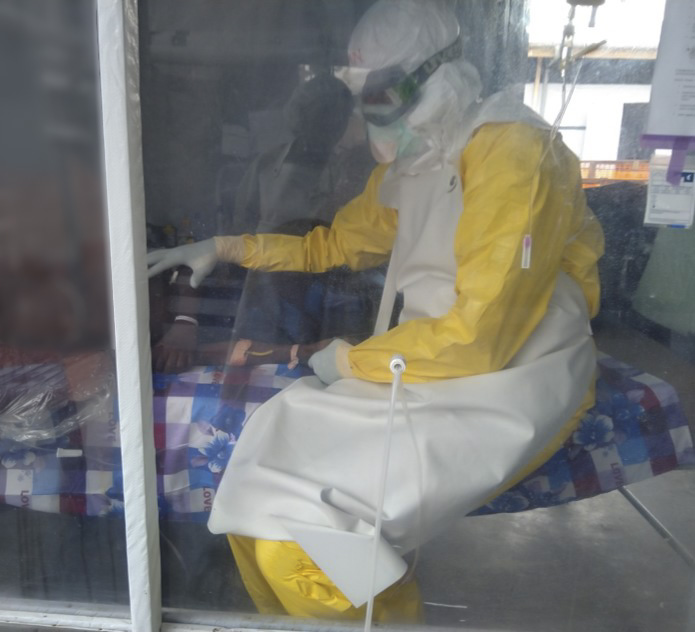
The Pamoja Tulinde Maisha (PALM, Kiswahili for “together save lives”) trial, a large Ebola research effort supported by the Frederick National Laboratory, has received the David Sackett Trial of the Year Award for 2019.

The Society for Clinical Trials bestows the award on one high-impact, high-quality trial. The recipient is selected from a field of nominated trials and chosen based on five criteria:
- The trial improves the lot of humankind;
- Provides the basis for a substantial, beneficial change in health care;
- Reflects expertise in subject matter, excellence in methodology, and concern for study participants;
- Overcame obstacles in implementation;
- Exhibits a design, execution, and results that are a model of clarity and intellectual soundness.
PALM launched in November 2018, three months after a major Ebola outbreak was declared in the Democratic Republic of Congo, to help patients and evaluate experimental treatments against the viral disease. Patients were randomly assigned to receive both standard of care and one of four treatments.
On August 9, 2019, an independent Data and Safety Monitoring Board reviewed the trial’s interim data and found that two treatments, the triple monoclonal antibody REGN-EB3 and a monoclonal antibody called MAb114, significantly improved patient survival and were much more effective than the control, a three-antibody cocktail known as ZMapp.
The board recommended that the trial enter an extension phase in which patients are treated with either REGN-EB3 or MAb114. Enrollment in the initial, four-treatment trial was discontinued, and the trial’s principal investigators quickly redirected, beginning the extension phase on August 10.
The results of the four-treatment phase were published in the New England Journal of Medicine in November 2019.
“The PALM team initiated the research very quickly, and it’s the first time we’ve managed, in an outbreak context, to investigate Ebola treatment options in a randomized controlled trial and reach a successful scientific conclusion,” said Kevin Newell, a project manager in the Frederick National Laboratory’s Clinical Monitoring Research Program Directorate (CMRPD) who was involved in the trial.
The Democratic Republic of Congo’s National Institute for Biomedical Research (INRB) and the U.S. National Institute of Allergy and Infectious Diseases (NIAID) co-sponsored PALM. Several other groups, including Doctors Without Borders, the International Medical Corps, and the Alliance for International Medical Action, supported the trial in an international effort coordinated by the World Health Organization.
Some days, you were at work in the middle of gunshots starting from morning till night, and besides that, you were still trying to do your work in the really best way and in accordance with all scientific rigors.
The Frederick National Laboratory provided extensive support through its work with NIAID. CMRPD coordinated critical shipments of supplies and medicines, helped the Congolese staff establish greater capabilities to conduct clinical trials, and helped to ensure data integrity and patient safety. The national lab’s Vaccine Clinical Materials Program manufactured 10,642 vials of MAb114, while teams across the organization oversaw subcontracts and purchasing.
“Being part of the PALM trial, being one of the implementing partners on the PALM team has been very gratifying,” Newell said.
According to those involved, PALM represents a triumph of clinical research and patient care in challenging circumstances. The study staff working in the Ebola treatment units faced the presence of armed paramilitary groups, regional instability, mistrust among the local population, violence, and sabotage in addition to the risk of potentially contracting Ebola. Some Congolese and other partner staff were killed, and two treatment units were set on fire.
Olivier Tshiani Mbaya, M.D., witnessed the dangers firsthand while working in the treatment units as a part of INRB.
“Some days, you were at work in the middle of gunshots starting from morning till night, and besides that, you were still trying to do your work in the really best way and in accordance with all scientific rigors,” said the physician, who joined CMRPD as a medical affairs scientist in November 2019.
Tshiani Mbaya was himself attacked alongside other staff by hostile members of the community while in an outbreak response team car. Despite such scenarios, the staff remained steadfast and returned to the clinics to try to save lives.
Amid the challenges, PALM was conducted with the scientific and ethical soundness of trials that occur in safer, traditional clinical environments. The trial not only treated patients enrolled on a randomized protocol, but it also completed the post-treatment follow-up period without missing any participants—a difficult achievement, even in traditional trials.
The Ebola outbreak in the Democratic Republic of Congo nearly ended last month, but new cases were discovered on day 40 of the 42-day case-free period that the World Health Organization requires before declaring that an Ebola outbreak has concluded. The Frederick National Laboratory will continue to support the PALM extension phase and clinical research in the country.
“It’s almost already two years of fighting against this outbreak, but we will not abandon this fight,” Tshiani Mbaya said.
For more information about the trial and the Sackett Award, see the Society for Clinical Trials’ press release.
By Samuel Lopez, staff writer; image courtesy of Ian Crozier, M.D.
Media Inquiries
Mary Ellen Hackett
Manager, Communications Office
301-401-8670
